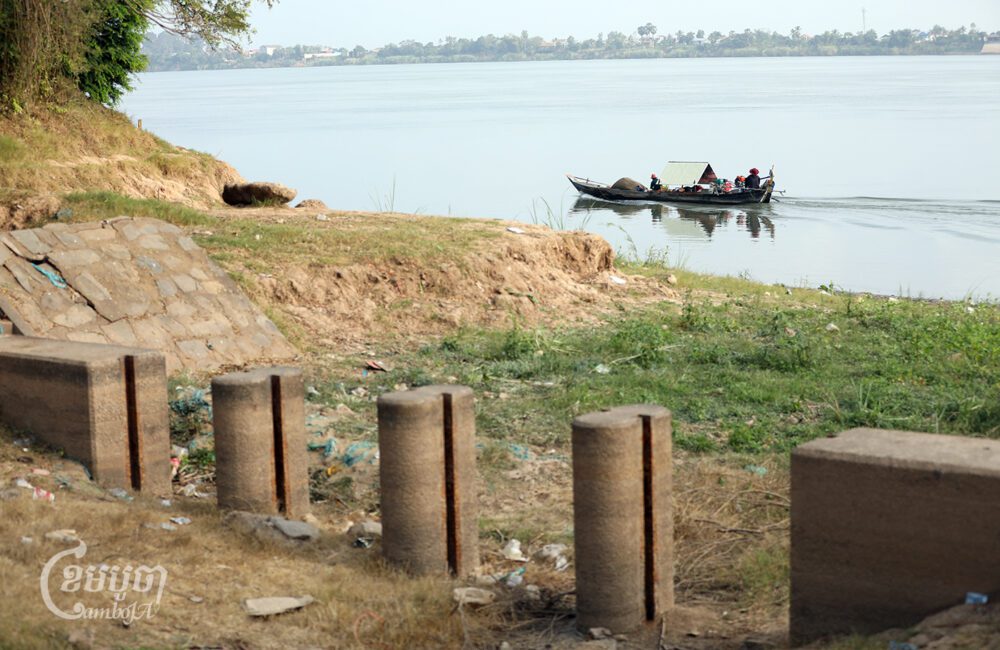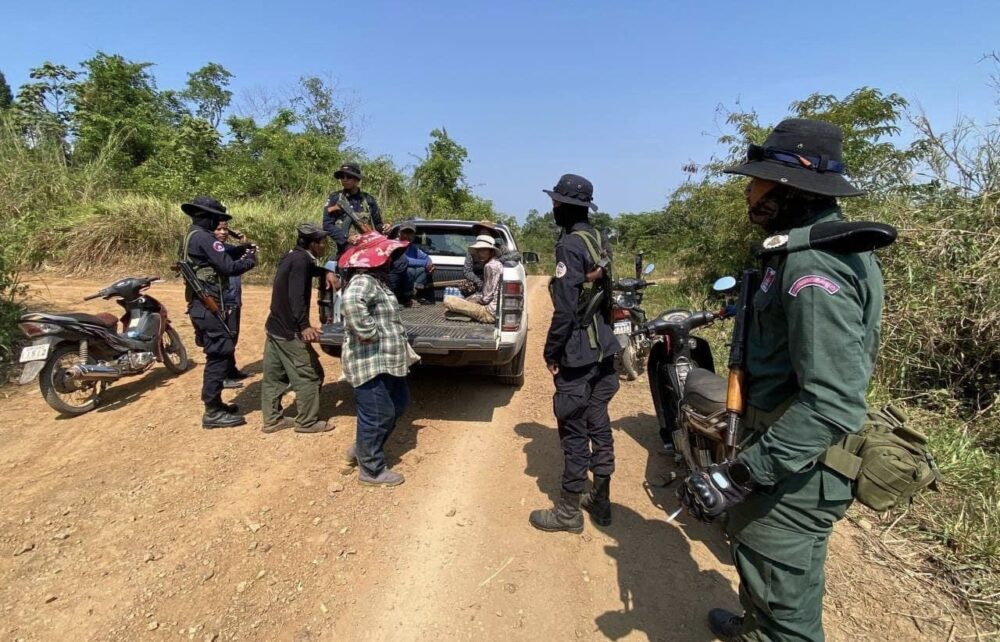Prime Minister Hun Sen took direct aim at former CNRP lawmaker Ho Vann and his family and threatened their safety for allegedly facilitating a protest outside the Chinese Embassy on Friday.
Hun Sen’s threat came a day after three CNRP supporters were charged with incitement for their participation in the same protest, where local police used excessive force to disperse the small group.
The prime minister was speaking on Monday at the ground-breaking ceremony for a new bridge that will connect Koh Pich and Koh Norea islands in Phnom Penh, when he accused Ho Vann and his family of orchestrating Friday’s demonstration outside the Chinese Embassy.
“[Ho] Vann, if you can stop this, do it. Your wife and children are living in Phnom Penh,” Hun Sen said.
“Be careful, your wife and children will not sleep well,” he added. “Do not push your wife and children into prison.”
Former CNRP leaders had called on opposition-aligned supporters to demonstrate against a potential Chinese military presence in Cambodia and to mark the 29th anniversary of the signing of the Paris Peace Agreement on Friday.
Hun Sen asked Ho Vann’s wife to stay away from funding the “rebel group’s” protest, but did not clarify if the former lawmaker’s spouse had paid for the protests. He also played an audio clip allegedly of the former lawmaker offering protestors money if they travelled to Phnom Penh.
“I will give $200 for [those] who are traveling,” a man’s voice could be heard saying.
“We will go to the Chinese Embassy, stand on the sidewalk north of the Chinese Embassy and around 40 police will be deployed to protect the Chinese Embassy, but not to threaten or mistreat us.”
Ho Vann and other senior members of the dissolved CNRP could not be reached for comment on Monday.
The threat to Ho Vann and his family is part of a wider pattern of harassment and intimidation of former CNRP members or those associated with them. This harassment has intensified since the dissolution of the CNRP in November 2017 and has since resulted in hundreds of arrests and detentions, according to rights groups.
Chak Sopheap, executive director at rights group Cambodian Center for Human Rights, said threatening former CNRP officials and peaceful protestors was in contravention of Cambodia’s human rights obligations.
“The targeting of individuals for their perceived or actual affiliation to the CNRP illustrates the [government’s] failure to respect, protect and fulfil its citizens’ fundamental rights and freedoms,” she said in an email.
The prime minister has vociferously rebutted claims made in the media and by the U.S. that Cambodia had signed a secret deal to allow China a military presence on Cambodian soil.
This alleged military presence would be at Ream Naval Base in Preah Sihanouk province or involve the use of an airport at the Dara Sakor Resort in Koh Kong province.
The Wall Street Journal reported last year that Cambodia and China had signed a secret agreement allowing Chinese armed forces to use the Ream base, and was part of Beijing’s efforts to boost its claim to valuable resources and territory in the nearby South China Sea.
In September, the U.S. Treasury Department sanctioned Chinese firm Union Development Group, which is developing the Dara Sakor Resort in Koh Kong. The sanctions were based on accusations of land evictions and corruption, but also pointed at the resort’s potential to host Chinese military assets.
Earlier this month, the Center for Strategic and International Studies in Washington D.C. released satellite imagery showing the demolition of an American-funded facility at Ream, adding fuel to speculation of a Chinese presence at the base.
Hun Sen on Monday again rejected any suggestions that China had been allowed military access to Cambodian territory and demanded that any evidence to prove otherwise be made public.
“I would like to say that I am very tired of all of you,” he said. “Where is your evidence to prove that Cambodia has a secret agreement with China for the exclusive use of Ream Naval Base for 30 years,” Hun Sen queried.
U.S Embassy spokesperson Chad Roedemeier said the United States wanted Cambodia to abide by a constitutional provision that prohibits foreign military bases in the country.
“The Prime Minister has said Cambodia would not allow an exclusive or permanent Chinese military presence at Ream, and we hope the government continues to abide by that position,” he said.
On Sunday, three people linked to the CNRP were charged with incitement for taking part in Friday’s protests. Kuch Kimlong, a Phnom Penh court spokesperson, confirmed that Lim San, Ton Nimol and Yoy Sreymom had been charged on Sunday for incitement and sent to pretrial detention.
“The investigating judge has charged them with incitement to disturb social security,” he said.
According to the Cambodia Criminal Code, a conviction under Article 495 for incitement carries a maximum prison sentence of two years.
National Police spokesperson Chhay Kim Khoeun refused to comment if other CNRP supporters or protestors would be arrested for attending Friday’s demonstration.
Chan Ton, the father of Ton Nimol, refused to accept that his son had committed a crime, and alleged that district security guards were responsible for the disruption caused outside the Chinese Embassy.
“He did not cause any disturbance to society, but instead we saw the authorities attacking them as they took a petition to the Chinese Embassy,” said Ton.
Hong An, a Banteay Meanchey resident who joined the protests, said police officials had visited her home in the northeastern province and that she was weary of going back.
“The authorities threatened that if anyone joined the protests in Phnom Penh, they would face problems,” she said. “I will not return because the authorities have visited my home. I will not go home.”
Soeung Senkaruna, spokesperson for human rights group Adhoc, said the crackdown on protests was an infringement on their right to advocate and assemble peacefully.
“The authority should facilitate them to submit the petition, and not crackdown or arrest them,” Senkaruna said. The recent detentions follow a slew of arrests of youth and environmental activists, who were protesting the arrest of prominent unionist Rong Chhun in July. Rights groups say at least 19 people, including artists, have been detained since July.








